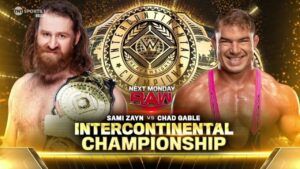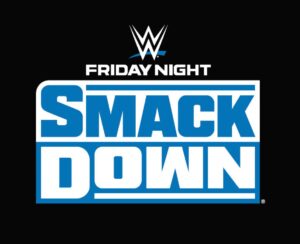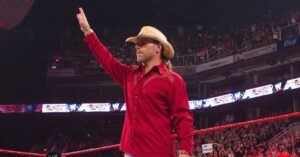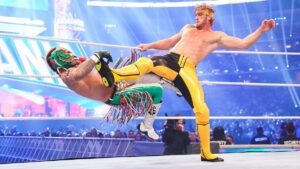Pro wrestling has long seen its share of comeback stories. Pro wrestlers who fell off the path of good health, or faded away after bad bookings, only to return to the spotlight years later with the adoration of a generation who grew up with them and reinvigorated by the opportunities with the day’s top stars. Former Ring of Honor World Champion PCO saw a huge career resurgence after a decade away from the sport a few years back, former 2x WWE Women’s Champion Jazz has seen a career revival in recent years, and the “Resurrection” of Jake “The Snake” Roberts after decades of substance abuse became a critically acclaimed documentary and has lead to his return to television with All Elite Wrestling (AEW). But in the past few years, another name from the past has emerged to reclaim their position in the world of pro wrestling – 2 Cold Scorpio, a veteran of nearly every major promotion there is, from WWE to WCW to NJPW to ECW and more, has overcome his own battles with personal demons and shrugged off sluggish TV runs, to become one of the top wrestlers in a strong US indie scene, proving that his aerial style is just as relevant today in 2021 as it was revolutionary in the 1990s. The innovator of the 450 Splash (which he admits he created “by accident” when he over-rotated on his entrance flip), his car crash style involved combining daredevil high flying offense with technical groundings, many of today’s top stars around the world owe a debt of inspiration to the groundwork Scorpio laid in his global endeavors from the 1990s to 2000s.

2 Cold Scorpio made his pro wrestling debut in 1985, and after competing in regional indies for the remainder of the decade, he was spotted by Vader, who recommended him to New Japan Pro Wrestling (NJPW). He traveled to Japan to learn at the NJPW Dojo and in 1991, made his debut for the company as Flying Scorpio, where he initially debuted in a tag team with Owen Hart. That year he competed in the Top of the Super Junior II tournament (the precursor to Best of the Super Juniors), in a field that included Hart, Fit Finlay, Jushin “Thunder” Liger, Negro Casas, Pegasus Kid (Chris Benoit), and eventual winner, Norio Honaga. He would remain a fixture in New Japan’s Junior Heavyweight division and in 1992 would often tag with Pegasus Kid as well. He also took part in the Top of the Super Junior III tournament, eventually won by Liger, in a field that featured Finlay, Honaga, Pegasus Kid, Negro Casas, Koji Kanemoto, El Samurai, and a young Eddie Guerrero. He also returned to Mexico to compete for Universal Wrestling Association (UWA) in 1992, where he competed as Black Scorpio, and by the end of the year joined World Championship Wrestling (WCW). At November’s WCW Clash of Champions XXI, Scorpio debuted as the mystery partner of then-WCW World Heavyweight Champion Ron Simmons, helping him defeat Cactus Jack, The Barbarian & Tony Atlas in a handicap match. Scorpio was booked strong in his TV appearances for WCW for the remainder of the year.
In early 1993, he was paired with another young star in WCW, Marcus Alexander Bagwell (before he became Buff), and that fall, they defeated The Nasty Boys to win the WCW World Tag Team Championships. Due to WCW’s working alliance with NJPW, he returned to represent WCW in Top of the Super Junior IV, although he competed as his New Japan persona, Flying Scorpio. The tournament was ultimately won by Pegasus Kid, but Scorpio competed in an expanded crew that featured Finlay, Guerrero, Liger, Honaga, El Samurai, Dean Malenko, Lightning Kid (Sean Waltman, X-Pac), Masao Orihara, and Shinjiro Otani. Scorpio continued to work for WCW into 1994, but in the spring, he was released from the company after failing multiple drug tests for marijuana.
But 2 Cold Scorpio didn’t stay on the unemployment lines for too long. He soon debuted for Eastern Championship Wrestling (ECW) and took part in their tournament to crown the new NWA World’s Heavyweight Champion, after WCW had seceded from the National Wrestling Alliance. He defeated 911 and Chris Benoit in the early rounds and faced Shane Douglas in the finals – which Douglas won and immediately vacated the title to declare himself the first ECW World Champion instead, in the famous promo that rebranded Eastern Championship Wrestling to Extreme Championship Wrestling. With the new creative vision of ECW has a no-holds-barred, anything goes promotion, 2 Cold Scorpio was freed from some of the traditional tropes he faced in WCW (and to a degree New Japan) and became one of ECW’s early stars. He also made his debut with AAA Lucha Libre in Mexico. Despite a minor setback with his WCW release, Scorpio was back on track, helping a new wrestling promotion achieve cult status and working with both AAA in Mexico and returning to New Japan that summer.
During his two years with ECW, he became one of the most influential high-flyers in the United States, and became a 4x ECW World Television Champion, and captured the ECW World Tag Team titles with The Sandman as well. He would frequently challenge for the ECW World Heavyweight title in between TV Championship reigns, against the likes of Sandman and Raven. His stock in the United States continued to rise and after losing a Loser Leaves Town match to Louie Spicolli at ECW November to Remember in November of 1996, he left to join the WWF. He made his debut the following night at WWF Survivor Series, rebranded as Flash Funk, where he joined the team of Yokozuna, “Superfly” Jimmy Snuka, and Savio Vega in an elimination match against the team of Diesel (Kevin Nash), Razor Ramon (Scott Hall), Vader and Faarooq (Ron Simmons). A month later, he was challenging Triple H for the WWF Intercontinental Championship on Monday Night Raw. While his Flash Funk persona was a diluted version of what 2 Cold Scorpio was in ECW and New Japan, it seemed he’d finally broken through into the big time.
He would continue to flirt with opportunities in the WWF mid-card – he faced Intercontinental Champion Owen Hart in July of 1997 – but Flash Funk was soon reduced to more of a Live Event performer than anything of substance on television. He would get infrequent title opportunities still, he faced Taka Michinoku for the WWF Light Heavyweight Championship in August of 1998 and D’Lo Brown for the WWF European Championship a month later, but by the fall, he had fallen to the bottom of the card – although it manifested in him joining Al Snow‘s J.O.B. Squad that November, rebranded back to simply Scorpio. The J.O.B. Squad became fan favorites and started to get a push, culminating in Scorpio and Bob Holly challenging Owen Hart & Jeff Jarrett for the WWF World Tag Team titles in January of 1999, but by the end of the month, 2 Cold Scorpio’s stint with the WWF had come to an abrupt end. Much like his departure from WCW, it was drug-related. According to Scorpio himself, the big money of working for the WWF had only encouraged his drug abuse, but he had long moved past marijuana. Now crack cocaine was his drug of choice. He was initially told WWF would help his recovery, but when he missed an appointment with Jim Ross after another binge, he was ultimately let go. It was just the wake-up call Scorpio needed and thanks to family and friends, he managed to clean up his addictions cold turkey.
https://www.youtube.com/watch?v=y66xHnu5rSw
He returned to Japan in an effort to rebuild his legacy and reputation, this time heading to All Japan Pro Wrestling that summer, where he quickly scored a challenge against AJPW World Junior Heavyweight Champion Yoshinari Ogawa. He also briefly returned to ECW, where he challenged ECW World Heavyweight Champion Mike Awesome in December on an episode of ECW on TNN. He remained with AJPW throughout 1999 and into 2000, but when Mitsuharu Misawa left AJPW in June of 2000 to start up Pro Wrestling NOAH, Scorpio was one of the All Japan stars who jumped ship to NOAH, along with such names as Vader, Naomichi Marufuji, Jun Akiyama, and others. Scorpio would spend the next seven years with NOAH, his longest tenure to date with a major promotion, where he became a 2x GHC Tag Team Champion and GHC Hardcore Openweight Champion, which he held for 316-days (the titles second-longest reign).
In 2006, Scorpio made a return to the WWE. But strangely, it wasn’t on the main roster. Instead, returning to his Flash Funk persona, he was sent to one of WWE’s developmental systems, Deep South Wrestling (DSW) instead. While he would make frequent appearances for WWE on Live Events, he never made WWE television during his tenure, which was ultimately ended in early 2007. In recent interviews, Scorpio has speculated that his return was purely to acquire the rights to the name 2 Cold Scorpio for the WWE 24/7 On Demand channel that WWE had launched in 2004. He was ultimately terminated before the end of his new WWE deal, which he claims resulted in him losing out on his royalty cheques for use of his name and image from ECW and WCW footage WWE had since acquired. Despite his release in May of 2007, he returned to the WWE one last time for a one-off appearance at the 15th Anniversary episode of Raw that December, where he competed in legends Battle Royal that also included Steve Blackman, Bob Backlund, Sgt. Slaughter, and Gangrel.
https://www.youtube.com/watch?v=Kzm8DEn9Do4
Over the next decade, Scorpio’s appearances would begin to dwindle. While he would still pop up here and there for big appearances, like with TNA/IMPACT Wrestling in 2010 and 2013, he mostly just took special match-ups in the US indies with the likes of Tommy Dreamer‘s House of Hardcore, as well as CHIKARA, International Wrestling Cartel (IWC), Absolute Intense Wrestling (AIW), and Capital City Championship Combat (C4). It was starting to look like his career was in its final stages, his legend mostly forgotten. He had some big matches with African-American stars on the rise in the US indies, such as Scorpio Sky (2015), Timmy Lou Retton (2016), Sugar Dunkerton (2017), Myron Reed (2018), AJ Gray (2018), and Darius Lockhart (2018), it almost seemed like he was being brought back more as a token legend that actually being treated as the innovator he truly was.
But in late 2019, 2 Cold Scorpio’s name began to re-emerge on Social Media with the proper buzz and respect long overdue for such an in-ring icon. The new breed of US indie stars was openly professing their love and inspiration for 2 Cold Scorpio, putting him near the top of the list of major influencers on the current scene of indie stars. He was no longer just a has-been “Legend” by a generation who remembered his Flash Funk persona of the 1990s more than his work in ECW or New Japan, but as the true influencer of an aerial game that not only helped inspire the initial indie revolution of the early 2000s following the demise of WCW and ECW, but a direct inspiration for this new generation who discovered previously overlooked names en masse via YouTube and, ironically, from matches found on the WWE Network in their youth. As 2020 began, Scorpio’s name carried much more reverence as more and more voices emerged, it became apparent that Scorpio was very much in demand – and not for his name per se. The man, now in his mid-50’s, could still go at a high level. In the summer of 2019, he had become the head trainer at Rocky Mountain Pro Wrestling Academy in his home state of Colorado and helped behind the scenes as a producer as well.
In December of 2019, he returned to AIW at Baby It’s 2 Cold Outside, where he competed in a four-way match with Wheeler YUTA, Matt Cross, and KTB, and a month later headed to Canada to face LuFisto in C4. In January of 2020, he had his biggest announcement in years, when he was the first name revealed for Game Changer Wrestling (GCW)‘s For The Culture event scheduled for WrestleMania week in Tampa. GCW had risen to become arguably the top national promotion in the US indies, and it was a guaranteed hot ticket. It was an all African-American showcase booked by former GCW World Champion AJ Gray, and the thought of Scorpio competing against one of the top names in the indies had fans relishing Scorpio’s return to prominence. Sadly, the Covid pandemic put a swerve in this massive comeback opportunity, but it only prolonged the inevitable. When For The Culture was rebooked for October of last year, 2 Cold Scorpio remained a central figure of the event, where he had an outstanding match against AR Fox.
JESUS CHRIST! 2 Cold Scorpio with a moonsault leg drop!#GCW #ForTheCulture @GCWrestling_
▶️https://t.co/g2iCb6t191 pic.twitter.com/ygDpJphwPM— Rob (@HeyImRob) October 10, 2020
He’s also become a regular with Violence x Suffering (VxS), where he’s faced the likes of Jordan Oliver, Myron Reed, Tony Deppen, and most recently this past weekend against Ken Broadway, keeping up with today’s technicians and high flyers with amazing competency for a 55-year old year. He’s also not afraid to return to his ECW roots and put his body on the line in hardcore action either – he recently competed on both nights of Sean Henderson’s Weekend at Sean’s 2 weekend in early February, where he took on deathmatch grapplers G-Raver and Lucky 13.
SCORPIO DROPS THE BOMB!!! 36 goddamn years in this business, unreal #WatchVxS@vxswrestling @indiewrestlinghttps://t.co/ieCmFUA3uy pic.twitter.com/eJPyEVcTKJ
— SirLARIATO (@SirLARIATO) February 28, 2021
As more and more US indies open up in the coming months, as well as a multitude of indie events happening during WrestleMania Week this year (back in Tampa), the thirst to see 2 Cold Scorpio live and in action against a legion of disciples who grew up on his matches on YouTube, WWE Network and other online abilities, has only widened over the past year. He’s already been announced for this year’s For The Culture, where he’ll be facing reigning IMPACT World Champion Rich Swann. Just when it seemed like Scorpio was about to be another lost legend in the annals of history, the revolutionary innovator of the 450 Splash has emerged as one of this generation’s greatest inspirations, and he has proven that even at 55-years old, he can still claim the sky as his canvas. It’s a testament to all the hardships he’s endured over a nearly 40-year career, from personal demons to booking missteps, to emerge into 2021 more relevant than he’s ever been in his career. Long live 2 Cold Scorpio. The King is here.
*FTC UPDATE*
ICYMI
2 COLD SCORPIO
vs
RICH SWANNStreaming LIVE on @FiteTV!
For the Culture
Thursday, April 8 – 1159PM
The Cuban Club – Ybor City, FL@collective2020 pic.twitter.com/OzyCc2uaGk— GameChangerWrestling (@GCWrestling_) February 22, 2021
Stay tuned to Last Word on Pro Wrestling for more on this and other stories from around the world of wrestling, as they develop. You can always count on LWOPW to be on top of the major news in the wrestling world, as well as to provide you with analysis, previews, videos, interviews, and editorials on the wrestling world.
Looking to talk wrestling, pro football, or any number of sports? Head on over to the LWOS Boards to engage in conversation with fellow fans!







